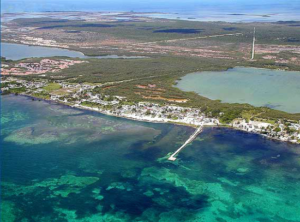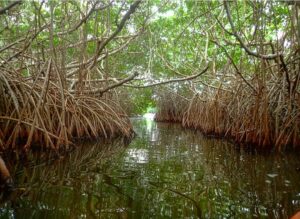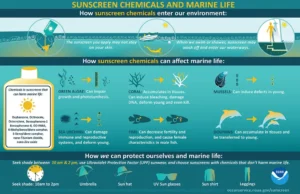
As summer approaches and people flock to the beaches, the importance of sun protection becomes paramount. However, the use of sunscreens has raised concerns, particularly when it comes to their impact on marine ecosystems, such as the precious coral reefs. One such place that highlights these concerns is the serene town of Xcalak, where the delicate balance between human enjoyment and ecological preservation is put to the test.
Sunscreens: A Double-Edged Sword
Sunscreens are undoubtedly essential for safeguarding our skin from the harmful effects of ultraviolet (UV) radiation. They come in various forms, offering a shield against sunburn and skin damage caused by excessive exposure to the sun. However, these very products that protect us on land might be posing a threat to marine life, especially in areas like Xcalak where the coral reefs thrive.
The Issue of Coral Bleaching
Coral reefs are vital marine ecosystems known for their vibrant colors and rich biodiversity. These reefs serve as nurseries for countless marine species and play a crucial role in maintaining the health of the oceans. However, coral reefs are facing a significant threat known as coral bleaching. This phenomenon is primarily caused by rising sea temperatures, pollution, and the increased presence of UV radiation due to factors like climate change. Coral bleaching occurs when stressed corals expel the algae that provide them with essential nutrients and their beautiful colors, leaving them vulnerable and white.
The Role of Sunscreen Chemicals
Recent studies have highlighted a link between certain chemicals commonly found in sunscreens and coral bleaching. Oxybenzone and octinoxate, two active ingredients used in many sunscreens, have been shown to disrupt the symbiotic relationship between corals and the tiny algae living within them, called zooxanthellae. This relationship is crucial for the health and coloration of corals. The presence of these chemicals can lead to coral bleaching, which ultimately weakens the reef ecosystem.
The Concern in Xcalak
Xcalak, nestled along the southern coast of Quintana Roo, Mexico, boasts some of the most pristine coral reefs in the Caribbean. The turquoise waters and abundant marine life make it a haven for divers and nature enthusiasts. However, the increasing popularity of this paradise brings its own set of challenges. The use of sunscreens by visitors and locals alike raises concerns about the potential impact on the coral reefs that are the heartbeat of this tranquil town.
Choosing Reef-Safe Sunscreens
The good news is that not all sunscreens pose a threat to coral reefs. Reef-safe sunscreens are formulations that avoid using harmful chemicals that contribute to coral bleaching. Instead, they use mineral-based ingredients like zinc oxide and titanium dioxide, which provide effective sun protection without harming marine life. Choosing reef-safe sunscreens is a conscious step that travelers and beachgoers can take to minimize their impact on delicate ecosystems like those found in Xcalak.

Educating and Raising Awareness
Raising awareness about the impact of sunscreens on coral reefs is essential for driving positive change. Local communities, tourists, and businesses in Xcalak can play a crucial role in spreading information about reef-safe sunscreens and adopting sustainable practices. Signs and educational materials in popular beach areas can inform visitors about the importance of using environmentally friendly sun protection products.
The Role of Regulation and Legislation
Addressing the issue of sunscreen impact on coral reefs goes beyond individual choices. Governments and regulatory bodies can contribute significantly by implementing policies that restrict the use of harmful sunscreen ingredients in sensitive marine areas like Xcalak. By creating designated zones where only reef-safe sunscreens are allowed, authorities can help protect these invaluable ecosystems.
A Call for Responsibility
As we enjoy the natural beauty and wonders of places like Xcalak, it is our responsibility to ensure that our actions do not harm the very environments we cherish. The choices we make regarding sunscreens can have far-reaching consequences on the health and vitality of coral reefs. By opting for reef-safe alternatives and supporting initiatives that promote marine conservation, we can contribute to preserving the delicate balance of nature for future generations.
In conclusion, the use of sunscreens in the sea is a topic that demands our attention, particularly in places like Xcalak, where coral reefs are treasures to be safeguarded. By understanding the potential impact of sunscreen chemicals on these ecosystems and making informed choices, we can enjoy the sun responsibly while protecting the health and beauty of our oceans. The harmony between human enjoyment and ecological preservation is achievable, and it begins with the conscious decisions we make today.












